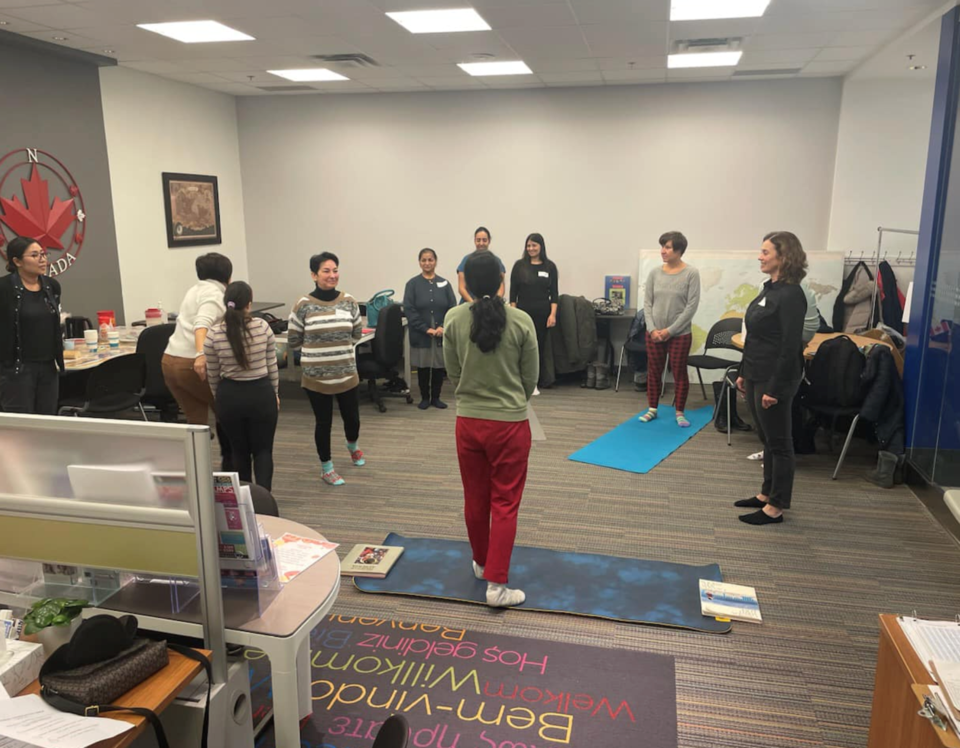Growing up, Ukrainian newcomer Masha was taught to “save her emotions for herself.”
“In public, we did not cry,” she said.
Last year, the Russian military camped outside of the northern Ukrainian city Masha called home, cutting off water, electricity and heat. Missiles screeched through the sky and tore apart many of the city’s landmarks. Thousands died either as a direct result of the bombings or of exposure to the cold, lack of medical support and shortages of food and medicine.
It wasn’t until she came to Canada that Masha (who asked to be referred to by her first name) felt comfortable crying openly about what happened to her home.
“It’s so different here,” she said. “You all the time show your emotions, what you feel. In Ukraine, we did not do this.”
Especially in recent years, Canadian culture has become more candid about mental health concerns and distressing experiences, according to Colleen Mayes, a community resource coordinator with the City of St. Albert.
In October, Mayes began participating in St. Albert Further Education’s conversation circles for newcomers. She comes once a month to talk about different aspects of mental health.
In the first session Mayes ran, she asked participants a simple question: "In the countries you’re from, do you talk about mental health issues, or do you keep them a secret?"
The answer was unanimous: These concerns were not to be spoken of openly.
“The stigma around mental health that newcomers bring from other countries is very real,” she said.
Mayes hopes to overcome the stigma by “encouraging people to open up and fostering connection.”
When she joins the conversation circle again in December, she will encourage the group to make affirmation cards, which contain positive and motivating messages.
“[It’s] a simple way to spread the importance of self-compassion while celebrating that there is strength in vulnerability,” she said.
Mental health concerns a growing challenge
Cheryl Dumont, executive director of St. Albert Further Education, said that mental health struggles have become “a top concern” for newcomers, right after housing, and the problem is only getting worse.
“We’re seeing people struggling with depression and anxiety,” Dumont said. “Handling the trauma and the fear, this war has been going on for a long time, and other wars in other places as well.”
The organization, which has limited capacity to provide mental health services, is considering applying for government funding to increase these supports.
For many, the pressure to find gainful work in the unfamiliar Canadian economy has taken the heaviest mental toll, according to Dumont.
Masha and her husband Ighor understand the dilemma well.
In Ukraine, Ighor worked in a comfortable management position at a car dealership, and Masha worked in customer service for a gas company.
Now Ighor works as a land surveying assistant, “shaking snow from his head” in the winter months, while Masha works at a St. Albert restaurant.
“Everyone who immigrates to Canada needs to prepare for this. We understood how this worked,” Ighor said.
They’re fortunate to have enough to get by and raise their two children, but they’ve noticed Canada has more of an emphasis on credentials than Ukraine, and they’d like to go back to school. Masha wants to work as a legal assistant, and Ighor wants to work in IT.
Supports out of reach
While Masha and Ighor have adjusted well to life in Canada since they arrived 10 months ago, they know others who have struggled. However, no one they know has sought the advice of a therapist or counsellor.
It’s not just a cultural wariness around speaking openly about mental distress that prevents some newcomers from accessing mental health care.
“[Newcomers] certainly cannot afford traditional mental health supports,” Dumont said. “We need to do more, and we will. Sometimes more takes money, though.”
In the meantime, St. Albert Further Education has been embracing the help of volunteers.
The organization in October started a yoga class led by volunteer ShanmugaPriya (Priya) Sanjeevi.
Sanjeevi arrived in Canada seven years ago from Chennai, India.
“I didn’t know how to approach people and how to start getting some relationships with people,” Sanjeevi said.
Sharing her knowledge of yoga helped her make friends.
Scheduled on Saturdays at St. Albert Centre Mall, Sanjeevi’s yoga class is unconventional.
Her pupils are still learning English, so she uses gestures and sign language to teach them. Further complicating matters is that most are unfamiliar with yoga.
She’s done two sessions at St. Albert Further Education. After the first session, Sanjeevi wasn’t sure whether the class, composed of newcomers of all backgrounds but primarily from Ukraine, liked the experience.
But, to her surprise, most wanted to return.
“At the end, they said, ‘I don’t know if I’m doing yoga correctly or not, but I’m just releasing my stress.’ That’s very important at this stage. That gives me joy.”
A future in Canada
Masha and Ighor said they’re happy living in St. Albert.
Their son, 7, can play in the Royal Edmonton Soccer Club, and their daughter, 8, gets to pursue her love of hip-hop dance.
They still have fears about family and friends caught in the war.
Masha finds time to call her mother every day, despite the nine-hour time difference between Alberta and Ukraine.
But they see a future for themselves here. They fit in, and their kids are happy, Ighor said.
As for Canada’s attitudes towards big displays of emotion, “I think it’s good,” Masha said.
“It’s better for your mental health — you want to cry, you cry.”




